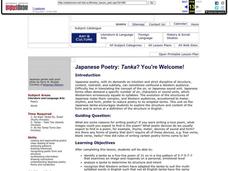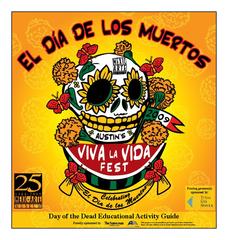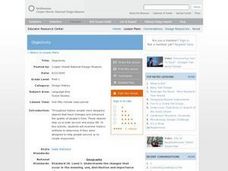Curated OER
Japanese Poetry: Tanka? You're Welcome!
High schoolers explore the structure and content of the Tanka form and to arrive at a definition of the structure in English. They analyze a tanka to determine its structure and intent and compose two Tanka; one in traditional form and...
Echoes & Reflections
The Ghettos
Young historians examine primary sources, including diaries, poems, and photographs, to consider the conditions in the ghettos and how they fit into the escalation of the Third Reich's plot against the Jewish people.
Echoes & Reflections
The "Final Solution"
Nazi policies shifted from deportation and imprisonment to extermination of the Jewish people in death camps in the "Final Solution." Learners examine photos of artifacts, read poetry written by survivors, analyze testimony from...
Mexic-Arte Museum
El Dia de los Muertos
Celebrate the traditional Mexican holiday El Dia de los Muertos! Explore the intricate history behind the traditions, compare other cultural rituals honoring the dead, and create sugar skulls. Learners read informational text on Aztec...
Curated OER
Pictures in Words: Poems of Tennyson and Noyes
Students analyze poems by Tennyson and Noyes. They identify examples of alliteration, onomatopoeia, personification, metaphor, and simile. Students create examples of alliteration, onomatopoeia, personification, metaphor, and simile.
Curated OER
Rhetorical Devices in a Primary Source
Analyze Martin Luther King Jr.'s famous and powerful "I Have a Dream" speech as a primary source document. After reading up on rhetorical devices and working in small groups to define terms, class members identify and explain the use of...
Curated OER
Important Arkansas People
Famous people in the history of Arkansas are the focus of a history instructional activity for kindergartners. Pupils identify important Arkansas citizens, such as President Bill Clinton. They create an illustrated poem that features...
Facing History and Ourselves
What Shapes Your Identity?
Sixth graders explore their individual identities. In this personal identity lesson, 6th graders write biopoems using the provided template. Students share their poems and respond to the poetry shared.
Curated OER
Jazz in America
Students participate in a class discussion about jazz music, compare improvisation with regular conversion, listen to various jazz musicians and compare and contrast their individual sounds.
Curated OER
Objectivity
Help young readers examine historic artifacts to determine if they were designed to help people survive or to create enjoyment. They identify objects that were designed to help people to survive and to enjoy themselves. Then compare and...
Curated OER
The Importance of Rivers in the Development of Early Civilizations Importance of Rivers in the Development of Early Civilizations
Sixth graders explore the role of rivers in the construction of early civilizations. In this importance of rivers lesson, 6th graders listen to a poem written by Langston Hughes and work cooperatively to develop a graphic organizer to...
Curated OER
Out of the Dust
Students examine 1930's America through literature. In this Dust Bowl instructional activity, students read Karen Hesse's Out of the Dust and set up vocabulary journals and question bookmarks to log their thoughts and impressions as they...
Curated OER
Action/Reaction: Art and Politics
Students examine three images that were responses to social and political turmoil World War I and II. In this political art activity, students analyze and discuss the example art. Students create a word poem, a collage, and their own...
Curated OER
Culture in Atlantic Canada
Ninth graders discuss the aspects of culture and what makes them unique. In small groups, 9th graders use digital cameras to take photos. Groups use their pictures to create a PowerPoint presentation storyboard of their culture.















